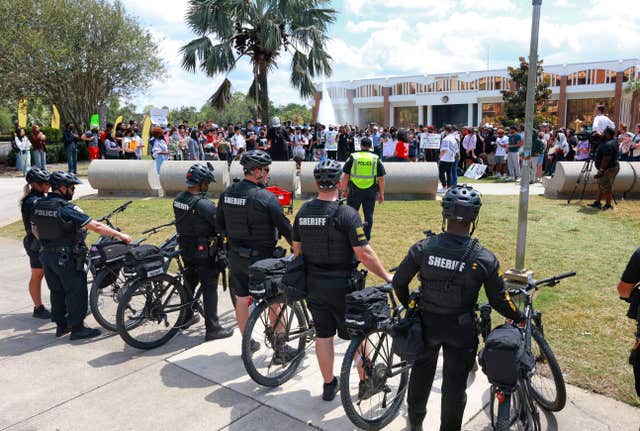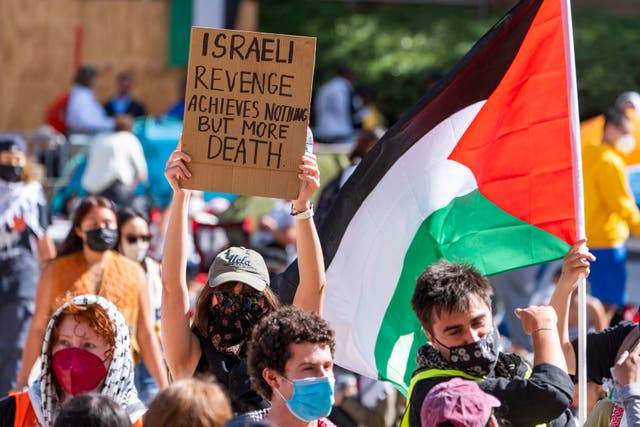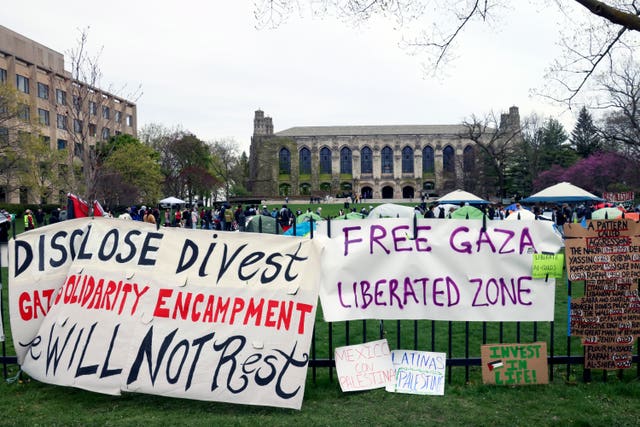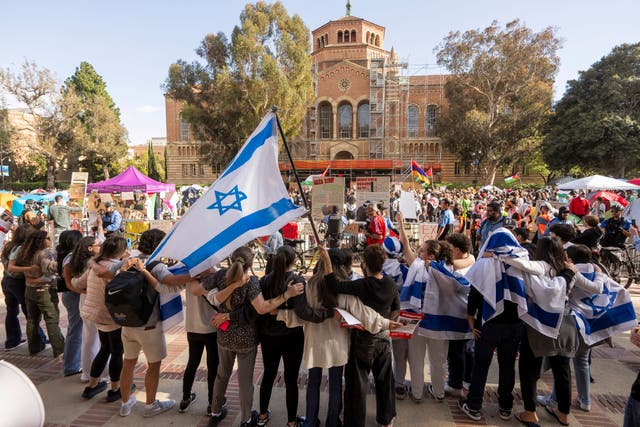US student anti-war protesters vow to continue demonstrations
Several faculties condemned university presidents who have called in police to remove protesters.

Students protesting against the Israel-Hamas war at universities across the US, some of whom have clashed with police in riot gear, vowed to keep their demonstrations going on Saturday.
Several university faculties condemned university presidents who have called in police to remove protesters.
As Columbia University continues negotiations with those at a pro-Palestinian student encampment on the New York university’s campus, the university’s senate passed a resolution on Friday that created a task force to examine the administration’s leadership, which last week called in police in an attempt to clear the protest, resulting in scuffles and more than 100 arrests.

As the death toll mounts in the war in Gaza, protesters nationwide are demanding that schools cut financial ties to Israel and divest from companies they say are enabling the conflict.
Some Jewish students say the protests have veered into antisemitism and made them afraid to set foot on campus.
Early on Saturday, police in riot gear cleared an encampment on the campus of Northeastern University in Boston. Several dozen students shouted and booed at them from a distance, but the scene was otherwise nonconfrontational.
The university said that the demonstration, which began two days ago, had become “infiltrated by professional organisers” with no affiliation to the school. It said antisemitic slurs were shouted.
The decisions to call in police, leading to hundreds of arrests nationwide, have prompted faculty members at universities in California, Georgia and Texas to initiate or pass votes of no confidence in their leadership.
They are largely symbolic rebukes, without the power to remove their presidents.
But the tensions pile pressure on university officials, who are already scrambling to resolve the protests as May graduation ceremonies near.
California State Polytechnic University, Humboldt, had given protesters who have barricaded themselves inside a building since Monday until 5pm on Friday to leave and “not be immediately arrested”.
The deadline came and went. Only some of the protesters left. After protesters rebuffed police earlier in the week, the campus was closed for the rest of the term.

Students representing the Columbia encampment, which inspired the wave of protests across the country, said on Friday that they reached an impasse with administrators and intend to continue their protest.
After meetings on Thursday and Friday, student negotiators said the university had not met their primary demand for divestment, although there was progress on a push for more transparent financial disclosures.
“We will not rest until Columbia divests,” said Jonathan Ben-Menachem, a fourth-year doctoral student.
In the letter sent to Columbia students on Friday night, the university’s leadership said “we support the conversations that are ongoing with student leaders of the encampment”.
Columbia’s president, Minouche Shafik, faced significant criticism from faculty on Friday, but retained the support of trustees.
A report by the university senate’s executive committee, which represents the faculty, found Ms Shafik and her administration took “many actions and decisions that have harmed Columbia University”.
Those included calling in police and allowing students to be arrested without consulting the faculty, misrepresenting and suspending student protest groups and hiring private investigators.
“The faculty have completely lost confidence in President Shafik’s ability to lead this organisation,” said Ege Yumusak, a philosophy lecturer who is part of a the faculty team protecting the encampment.
In response, university spokesperson Ben Chang said in the evening that “we are committed to an ongoing dialogue and appreciate the Senate’s constructive engagement in finding a pathway forward”.

“What I said was wrong,” Mr James said in a statement. “Every member of our community deserves to feel safe without qualification.”
Mr James, who served as a spokesperson for the pro-Palestinian encampment as a member of Columbia University Apartheid Divest, was banned from campus on Friday, according to a Columbia spokesperson.
Protest organisers said Mr James’ comments did not reflect their values. They declined to describe Mr James’ level of involvement with the demonstration.

The University of Southern California cancelled its May 10 graduation ceremony on Thursday, a day after more than 90 protesters were arrested on campus. The university said it will still host dozens of commencement events, including all the traditional individual university ceremonies.
Universities where faculty members have initiated or passed votes of no confidence in their presidents include Cal Poly Humboldt, University of Texas at Austin and Emory University.
Students in Paris inspired by the Gaza solidarity encampments at US campuses peacefully evacuated a campus building at a prestigious French university late on Friday after days of tensions.
The head of the Paris Institute of Political Studies, known as Sciences Po, said an agreement was found with students. Sciences Po counts President Emmanuel Macron and Prime Minister Gabriel Attal among its many famous alumni.
Tensions had break out on the campus as pro-Palestinian students sought to occupy an amphitheatre earlier this week.
On Friday, pro-Palestinian and pro-Israeli demonstrators faced each other in a tense standoff in the street outside the school. Riot police stepped in to separate the opposing groups.
Students later agreed to leave the site.





